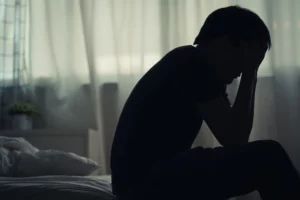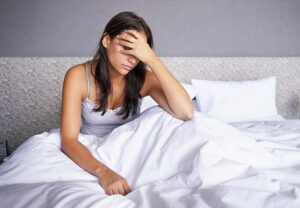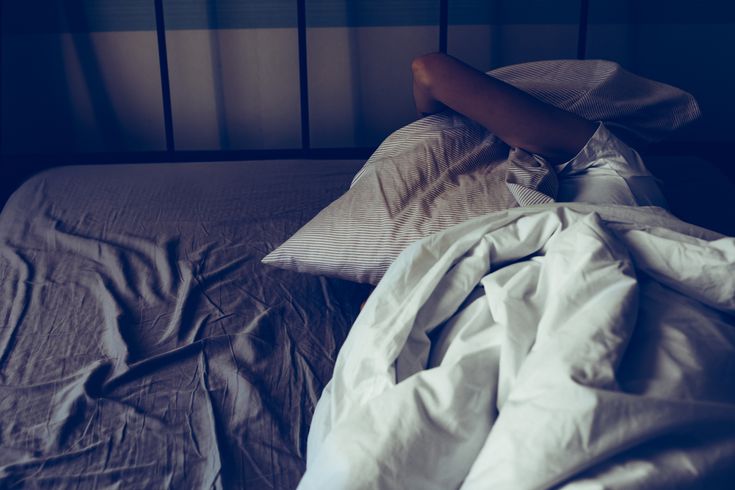Depression and sleep problems often go hand in hand. In fact, insomnia is one of the most common symptoms of depression. But did you know that treating your sleep problems can also help improve your mood? In this blog post, we will discuss the link between depression and sleep and provide some tips on how you can get a good night’s sleep.
Contents
How Depression And Sleep Are Connected?
 Depression is a mental health disorder that can negatively affect how you think, feel, and act. It can lead to a variety of emotional and physical problems and can decrease your ability to function at work and home. And sleep is one of the first things that are affected by depression. People with depression often have trouble falling asleep or staying asleep.
Depression is a mental health disorder that can negatively affect how you think, feel, and act. It can lead to a variety of emotional and physical problems and can decrease your ability to function at work and home. And sleep is one of the first things that are affected by depression. People with depression often have trouble falling asleep or staying asleep.
Now, they both shares a strong connection with each other. Let’s discuss how sleep and depression are connected and what can be done to improve the quality of your sleep.
Many different factors can contribute to both depression and sleep problems. For example, depressed people may have trouble falling asleep because they’re ruminating on negative thoughts or events from the day. And people with insomnia may be more likely to become depressed because they’re not getting the restorative benefits of sleep.
Another way that sleep and depression are connected is that some of the same medications used to treat depression can cause insomnia. This is especially true of older antidepressants known as tricyclics. Some newer antidepressants, such as selective serotonin reuptake inhibitors (SSRIs), can also cause insomnia in some people.
So, in these ways both depression and sleep are connected with each other. But, fortunately, some things can be done to improve the quality of your sleep.
Is Oversleeping A Symptom Of Depression?
 There’s a lot of debate on whether oversleeping is a symptom of depression or not. Some experts say that it can be, while others claim that it’s merely a side effect. However, there’s no denying that the two are closely connected.
There’s a lot of debate on whether oversleeping is a symptom of depression or not. Some experts say that it can be, while others claim that it’s merely a side effect. However, there’s no denying that the two are closely connected.
Oversleeping is often a symptom of major depressive disorder. In fact, one study found that people who overslept were more likely to be diagnosed with depression than those who didn’t. There are several reasons why oversleeping and depression may be linked.
- For one, depressed people often have trouble sleeping through the night. This can lead to fatigue, which can in turn lead to oversleeping during the day.
- Another possibility is that oversleeping may be a way of coping with depression. When people are depressed, they often want to avoid activities and social interaction. Sleeping can be a way of doing this.
- Lastly, it’s possible that oversleeping and depression are caused by the same underlying problem. This could be a medical condition, such as an imbalance in hormones or neurotransmitters.
This is still an area of research, and more studies are needed to confirm any potential link between oversleeping and depression. However, if you’re struggling with both conditions, it’s important to seek help from a doctor or mental health professional. They can provide you with treatment and support to help you feel better.
How Can You Manage Depression Sleep?
It can be extremely tough to manage depression and sleep, but it is so important to get a good night’s sleep. Here are some tips:
Create a bedtime routine
The bedtime routine is one of the first things that people with depression should focus on. This simple act can help you relax and prepare for sleep. It can be as simple as taking a bath or reading a book before bed. Also, it is important to avoid watching television or working on the computer in the hours leading up to sleep.
When you have a bedtime routine, stick to it as much as possible. This will help train your body to know when it’s time to sleep. This will make it easier to fall asleep and stay asleep.
Exercise regularly
 Depression can make it hard to find the motivation to exercise, but it is one of the most important things you can do to improve your sleep. Exercise releases endorphins, which have mood-boosting effects. It also helps to regulate your body’s sleep-wake cycle. aim for at least 30 minutes of moderate exercise most days of the week.
Depression can make it hard to find the motivation to exercise, but it is one of the most important things you can do to improve your sleep. Exercise releases endorphins, which have mood-boosting effects. It also helps to regulate your body’s sleep-wake cycle. aim for at least 30 minutes of moderate exercise most days of the week.
You can choose any exercise you enjoy, but some good options for people with depression include walking, biking, swimming, and yoga. If you have trouble sticking to an exercise routine, try working out with a friend or joining a class.
Eat healthily
A healthy diet is always important, but it’s especially crucial when you’re struggling with depression. Eating lots of processed foods, sugary snacks, and alcohol can make your symptoms worse. Focus on eating fresh fruits and vegetables, lean protein, whole grains, and healthy fats. Also, be sure to stay hydrated by drinking plenty of water throughout the day.
So, your diet impacts how you feel both physically and mentally. Eating right can help improve your energy levels, mood, and overall sense of well-being.
Avoid caffeine
This is one of the most important pieces of advice for people struggling with depression and sleep. Caffeine is a stimulant, which means it can keep you up at night and make it harder to fall asleep. It can also make you more anxious, which can worsen symptoms of depression.
If you’re having trouble sleeping, avoid caffeine after noon and limit your intake to no more than 200 milligrams per day. You might also want to avoid alcohol, which can disrupt sleep. While a glass of wine or beer before bedtime can help you relax, drinking too much can lead to wakefulness later in the night.
Try aromatherapy
This therapy involves using essential oils to help improve your mood and promote relaxation. Research has shown that certain essential oils can be effective in treating depression. To try aromatherapy, add a few drops of essential oil to a diffuser or add it to your bathwater. You can also apply diluted essential oil to your skin.
Some essential oils that may help treat depression include:
- Lavender
- Bergamot
- Chamomile
- Ylang-ylang
- Clary sage
If you’re interested in trying aromatherapy, talk to your doctor or a qualified aromatherapist first. Make sure to purchase high-quality essential oils from a reputable source.
Listen to soothing music
 Sometimes, soothing music can help with depression and sleep. It can be a great way to relax before sleep. Different types of music can help with relaxation and sleep. Some people find white noise helpful while others find nature sounds or classical music helpful. If you want to try out this method, make sure to choose music that doesn’t have lyrics so it doesn’t keep you awake. you might want to try out some different types of music to see what works best for you.
Sometimes, soothing music can help with depression and sleep. It can be a great way to relax before sleep. Different types of music can help with relaxation and sleep. Some people find white noise helpful while others find nature sounds or classical music helpful. If you want to try out this method, make sure to choose music that doesn’t have lyrics so it doesn’t keep you awake. you might want to try out some different types of music to see what works best for you.
Practice relaxation techniques
There are many different relaxation techniques that can help to ease symptoms of depression and improve sleep quality. Some examples include:
- Progressive muscle relaxation
- Deep breathing exercises
- Visualization
Practicing these techniques regularly can help to reduce stress levels and promote better sleep. Each one is easy to learn and can be done anywhere, at any time.
Talk it out
Having someone to talk to about your depression can make a big difference. Whether it’s a friend, family member, therapist, or hotline, talking openly about what you’re experiencing and how you feel can help lessen your burden. You can also try to journal to share your thoughts and feelings in a private space.
Take therapy
Therapy is an important part of treating depression. It can help you understand your condition and develop healthy coping mechanisms. If you’re struggling with depression, consider talking to a therapist. There are many different types of therapy, so it’s important to find one that’s right for you. Some people prefer individual therapy, while others find group therapy helpful.
No matter what type of therapy you choose, it’s important to be open and honest with your therapist. This will help them understand what’s going on and how they can best help you.
Join a support group
Support groups can provide a sense of community for people who are struggling with depression. This can be especially helpful if you’re feeling isolated and alone. It gives you the opportunity to share your experiences with others who understand what you’re going through. There are many different types of support groups available, so it’s important to find one that’s right for you.
Consider medicine
 If depression sleep is a regular occurrence for you, your doctor may prescribe medication. Some types of antidepressants can make it easier to fall and stay asleep. Talk to your doctor about all of your options before taking any medication. Because medications might have side effects, it’s important to work with your doctor to find the best possible option for you.
If depression sleep is a regular occurrence for you, your doctor may prescribe medication. Some types of antidepressants can make it easier to fall and stay asleep. Talk to your doctor about all of your options before taking any medication. Because medications might have side effects, it’s important to work with your doctor to find the best possible option for you.
So, these are some ways you can manage your depression sleep. If you have trouble with any of them, talk to your doctor. They can help you figure out what’s causing your sleep problems and the best way to treat them. In the meantime, keep up with your healthy habits and give yourself some grace. Depression is tough, but you can get through it.
Conclusion
In conclusion, depression and sleep are two-way streets. Depression can lead to sleep problems, and sleep problems can lead to depression. Sometimes, it can be difficult to tell which one came first. However, there are treatments available for both depression and sleep disorders. If you think you might be suffering from either of these conditions, please don’t hesitate to reach out to a mental health professional for help.
For more information and guidance, please get in touch with our expert therapists at Therapy Mantra. They will be more than happy to assist you on your journey to recovery. Contact us today to learn more about our services. You can also book an online therapy session or download our free Android or iOS app.


